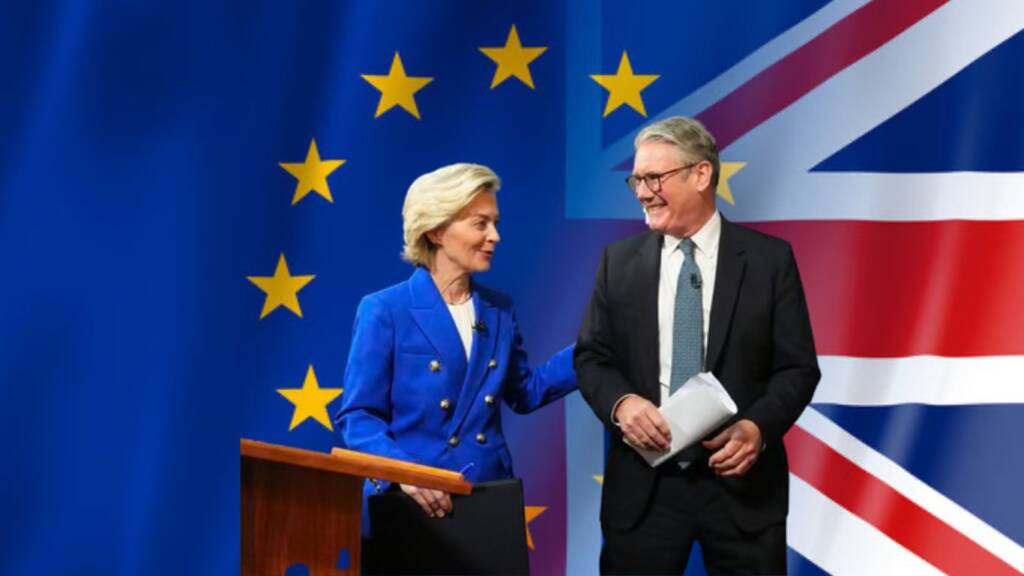The United Kingdom and the European Union have agreed to a major reset in their relationship, marking the most important shift since Brexit. These new agreements cover a wide range of issues, including defence, trade, travel, energy, and more. Both sides say this marks a new chapter of cooperation after years of tension.
Here’s a breakdown of what has been agreed and what it could mean for people and businesses in the UK and across Europe.
Defence and Security Partnership
For the first time since Brexit, the UK and EU have agreed to work closely on defence and security. This deal was not sought by previous Conservative governments but has now been made a priority by Prime Minister Keir Starmer’s Labour government.
This agreement is especially important because of the war in Ukraine and growing pressure on Europe to strengthen its defence. The new pact will allow British companies to take part in a huge €150 billion EU programme aimed at improving Europe’s military strength.
The UK will also be able to join EU missions in times of crisis and take part in joint defence purchases. This means better coordination and more opportunities for UK companies in the defence industry.
Food Standards and Trade
The two sides have also agreed on a veterinary deal, known as a Sanitary and Phytosanitary (SPS) agreement. This will make it easier to trade food products such as meat and dairy between the UK and the EU.
This agreement removes unnecessary border checks, helping farmers and food businesses. It will also stay in place without a time limit, giving stability to businesses on both sides.
Importantly, the UK says it has kept its high food standards, and that these were not lowered during talks with the US on separate trade issues.
Travel and Mobility for Young People
One major area of change is the movement of young people. The UK and EU plan to create a youth mobility scheme, which would make it easier for people under 30 to travel and work in each other’s countries.
The UK wants the scheme to be limited in both time and numbers, and it will not bring back full freedom of movement. However, it could offer similar benefits to existing deals the UK has with countries like Australia and New Zealand, where young people can live and work abroad for up to three years.
The UK is also in talks to rejoin the Erasmus+ Programme, which allows students to study or work in another EU country.
Migration and Border Control
Both sides also plan to work more closely to stop illegal migration, especially across the English Channel. This has long been a problem, particularly between the UK and France.
There are also plans to improve the sharing of data and possibly make professional qualifications easier to recognize across borders. This would help workers in certain fields like law, medicine, and engineering.
Fishing Rights
The UK and EU have agreed to extend fishing access until June 2038, 12 years longer than the previous agreement. However, the UK says the deal does not increase how much fish EU boats can catch in British waters.
The UK also plans to invest £360 million to modernize its fishing industry with better equipment and technology.
Fishing has been a difficult issue since Brexit, with several disputes and even court cases over fishing rights.
Energy and Carbon Markets
The UK and EU will explore ways to make energy trading more efficient. Since leaving the EU’s internal energy market, Britain has faced more complex systems for importing electricity.
In 2024, about 14% of Britain’s electricity came from abroad, a record high. Better cooperation could help reduce costs and increase energy security.
The UK and EU are also working on linking their carbon markets. This would mean businesses that emit carbon would be treated the same under both systems, which could avoid new EU taxes and support climate goals.
Easier Travel for Holidaymakers
UK travelers will soon find it easier to pass through passport control in Europe. The EU says no legal issues are stopping UK citizens from using automatic e-gates at airports, and several countries may soon allow this.
There will also be a new passport system to help UK pet owners travel more easily with their animals, removing the need for repeated vet certificates.
Final Thoughts
These agreements mark a big step in improving UK-EU relations after years of difficulties following Brexit. While many details still need to be worked out, the overall direction is clear: closer cooperation, more opportunities for businesses and young people, and smoother travel.
Both sides say this is just the beginning, and more deals may follow in the months ahead.
